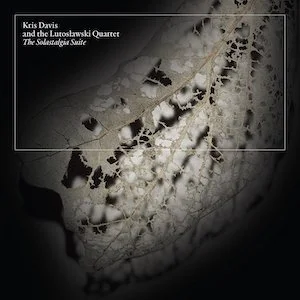Label: Pyroclastic Records, 2026
Personnel - Kris Davis: piano, composition + Lutoslawski Quartet - Roksana Kwasnikowska: violin; Marcin Markowicz: second violin; Artur Rozmyslowicz: viola; Maciej Mlodawski; cello.
Commissioned by the Jazztopad Festival in Wroclaw, Poland, The Solastalgia Suite marks the first opus for piano and string quartet by the exploratory Canadian pianist and composer Kris Davis. The Lutoslawski Quartet helps give voice to compositions influenced by Olivier Messiaen and thematically centered on philosopher Glenn Albrecht’s term solastalgia, a word that defines a form of homesickness experienced while one is still at home.
The opener, “Interlude”, ushers the listener into the record’s distinctive world through a sequence of energetic, staccato-driven gestures, counterpoint, and improvisation. If this piece coheres and enchants, “An Invitation to Disappear” deepens the sense of contemplation and emotional pull, combining restless shards of strings with beautifully shaped, piano-centered passages.
In “The Known End”, modern classical and contemporary chamber elements generate suspenseful, cinematic cadences, punctuated by abrupt starts and stops and kinetic piano reflections. The string quartet’s broad range of attack yields sections that explore contrasting variations, combinations, and atmospheres, with Davis using dynamics expressively throughout. “Pressure & Yield” feels harmonically open, placing acerbic bowed cello and violin at the heart of an intriguing, tense dialogue.
Featuring prepared piano, “Towards No Earthly Pole” draws everything down to a hush, though its repetitiveness slightly dulls the impact. By contrast, “Degrees of Separation”, with its firm sense of direction, is whimsically structured, blurring the boundaries between composition and improvisation through finely interlocking moments and responsive interplay. It proves more compelling than most of the preceding pieces, introducing a broader spirit of adventure, even in passages dominated by dreamy piano textures set against floating strings.
One might wish the earlier movements shared the same strength and dynamism as this closing statement. Still, despite a degree of unevenness, those inclined to find beauty in abstraction and creative risk will discover a rewarding experience in The Solastalgia Suite.
Favorite Tracks:
01 - Interlude ► 02 - An Invitation To Disappear ► 08 - Degrees of Separation










